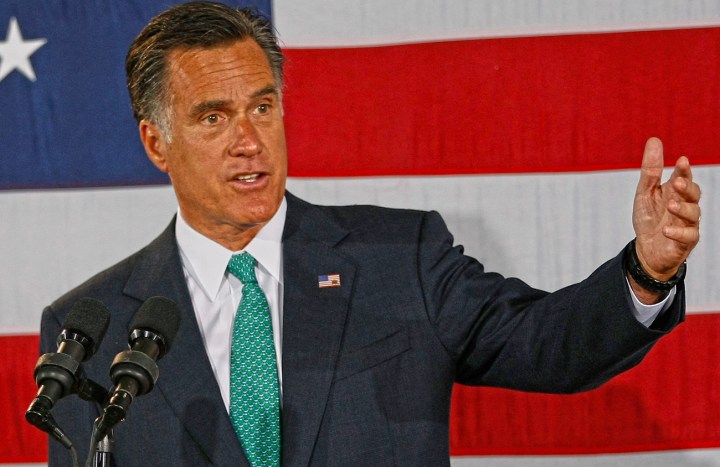In most presidential election calendars, a single day when New York, Connecticut, Delaware, Rhode Island and Pennsylvania all hold their primaries would be a big news day for an election campaign. But with Mitt Romney all but proclaimed his party’s nominee, he chose to return to New Hampshire to give his first big-picture speech in the next phase of the campaign. J BROOKS SPECTOR looks in.
For Tuesday night’s speech, Romney gave it the title: A Better America Begins Tonight. It was tipped as his definitive pivot away from all those bruising and awkward intra-party primary debates and all that messy negative campaigning – and onward to messy and bruising negative campaigning in the general election campaign against incumbent President Barack Obama.
The Republican Party’s nominating convention in Tampa, Florida, is still four months into the future, but all those un-Romney candidates like Rick Perry, Tim Pawlenty, Michele Bachmann and Herman Cain have now dropped out of the hunt. Rick Santorum has “suspended” his campaign as well, in the face of now insurmountable odds.
Meanwhile, Newt Gingrich’s increasingly quixotic campaign is at least $4-million in debt and now barely registers a pulse, let alone a chance. Yes, Texas congressman Ron Paul continues to plug away in the primaries, pulling in about 10% of Republican primary voters. But with no chance at winning the actual nomination, Paul is effectively cheerleader for a set of ideas at odds with the larger tide of Republican sentiment, let alone with most independent voters or Democrats.
And so Romney’s great challenge now is to position himself as a candidate who can appeal to the great middle ground of voters – even as he must shore up his still-lukewarm acceptance by rightwing-issue activists, social conservatives and the economically disaffected voters who populate the various warring wings of the Republican Party.
Analysts and commentators will be thoroughly dissecting the profiles of his voters, state by state, to measure the depth – or lack of it – of Romney’s success in wooing voter groups that had not given him much joy in many of the other, earlier primaries.
As a result, attention is already shifting to evaluate how Romney frames the rhetoric for his general election campaign in making a gentle shift to the centre, where most of the voters are, even as he tries to shore up the rate of support for him by those in his party who suspected his political policy orientations so far. Thus the reason why Tuesday night’s speech loomed large for Romney’s general election candidacy.
Having earlier shifted rightward as he fought off challenges from other Republicans, he has now indicated an initial willingness to think about such things as a wider array of immigration policies, including Florida senator Marco Rubio’s idea to open up a channel for some young people to obtain visas to stay in the US.
In addition, he embraced the idea of a temporary extension of lower interest rates for government-backed student loans, a policy backed by none other than Barack Obama.
His other big challenge is to refine his thinking about the person he wants as his running mate – and who can help him the most with the American electorate. Under the American political system as it has evolved, the presidential nominee essentially has a free hand to pick the vice-presidential candidate. The choice usually revolves around several key variables: perceptions of ideological and geographical balance; demonstrated ability to carry a hotly disputed, large-population battleground state like Florida, Ohio, Missouri or Pennsylvania; and, increasingly, who can appeal to an important demographic group whose votes could weigh heavily in the final balloting.
The thing of it is, however, that in the American system one doesn’t campaign openly for the vice presidency. Rather, someone who is lusting after the job makes all kinds of public noises about how the decision rests with the presidential candidate and how he or she really loves what it is they are doing now. And, oh yes, if they were summoned to run, they would certainly weigh the challenges carefully and, just in case it wasn’t already clear, the decision of who the presidential candidate picks rests solely with him.
To do this egg dance, they arrange to be photographed in appropriate-looking circumstances, where they can be supportive of the candidate. As a result, a dozen or so key Republican politicians have already campaigned with Romney in earlier primary states and these efforts have “given Mr Romney the chance to learn who is perpetually late, who might overshadow him, who relates well to him and who, of course, is a great campaigner,” says The New York Times.
That paper’ chief political statistical fundi, Nate Silver, commented about the impending pick: “In comparison to the dog-and-pony show that has dominated the political news cycle as of late, the question of whom Mitt Romney might pick as his vice-presidential nominee is at least one of some substantive importance. Since 1900, about 25% of the men and women nominated for vice president by the major-party candidates have later become presidential nominees themselves, and 15% have actually become president, whether by winning the office on their own or by succeeding an incumbent who died or resigned in office.”
For lessons in how to do this dance step with the right rhythm, keep a watch on Rubio over the next several months. The New York Times, following Rubio on the campaign trail with Romney in Pennsylvania, reported “As Mr Rubio campaigned with him on Monday, standing at his side quietly as Mr Romney, a former governor of Massachusetts, fielded questions on illegal immigration, he also became the latest member of the up-and-coming Republican establishment to try out as a potential vice-presidential candidate with the party’s likely nominee.”
“Mr Rubio, whose appearance in Pennsylvania with Mr Romney set off a new series of vice-presidential ripples, stayed relentlessly on message: ‘I’m not talking about that process anymore,’ Mr Rubio said when asked if he believed that, as a first-term senator, he was experienced enough to be Mr Romney’s ‘No. 2, a heartbeat away.’ ” Yup, that’s the way to do it.
But don’t take your eye entirely off several other possible names: New Mexico governor Susana Martinez; Nevada governor Brian Sandoval; Virginia governor Bob McDonnell; Indiana governor Mitch Daniels; Ohio senator Ron Portman; New Hampshire senator Kelly Ayotte; South Carolina governor Nikki R Haley; South Dakota senator John Thune and even New Jersey’s famously acerbic governor Chris Christie. Even Wisconsin congressman Paul Ryan and Virginia congressman Eric Cantor are apparently in the mix, given their congressional leadership positions dealing with budget policy. However, representatives have only rarely been nominated for either top position.
Some of these candidates – theoretically – could appeal to difficult-for-Republicans-to-carry demographics like women and Latinos, or they already have national level experience with tough policy and budget management.
In the case of governor Christie, he offers his popularity in a relatively big state like New Jersey in the Northeastern part of the US that conceivably could spill over to other big, nearby states. One key problem for Romney is to add some sizzle to his campaign to offset his starchy “white bread” image. The image that goes along with his shape-shifter approach to various emotionally freighted policies still worries some of his more conservative co-Republicans.
But, as The Economist observed recently, Romney’s rightward tilt to gain the nomination has actually carried “him a long way from where he started. By contrast, his 2010 book, No Apology, read more like a McKinsey report on managerial efficiencies for the US economy,” ranging over the business practices of Japanese doctors to how the Comcast cable company invests its profits. All in all, the book and his policy platform from last year list nearly 60 specific proposals. There’s lots of detail but not much poetry.
Thus the reason why commentators anxiously awaited Romney’s speech – and the spin doctoring that will inevitably follow – was to see just how Romney positions himself on ideological grounds to satisfy that anticipated swing to the centre and to mollify the right wing of his party.
In addition to the presidential election, of course, the entire House of Representatives, about a third of the Senate, numerous governors and thousands of other state and local offices are also up for grabs. Building on their success with the 2010 congressional election that shifted control of the House to Republicans, conservative political advocacy groups are now making major financial commitments to support an effort to capture the Senate as well – a shift of four or five senators could probably do it.
Conservative groups argue that winning the Senate is just as important as winning the White House. And this financial commitment is separate from the expected onslaught of Super PAC money that will support Romney’s efforts to gain the White House.
The New York Times, surveying these groups, has reported that they “have committed at least $17-million to television commercials in more than a dozen states from Florida to Hawaii, in most cases dwarfing what their Democratic opponents have spent. Their plans call for an effort that will exceed $100-million by Election Day, strategists for these groups said, far surpassing their efforts in 2010, a high-water mark for outside money in politics.”
In the coming weeks, such groups will be making additional commitments in states where Democratic candidates are particularly vulnerable and the immediate objective is to “use hard-hitting television ads to tether Democratic candidates to the budget deficit, lacklustre economic growth and the perception that government has become too intrusive and unmanageable”.
All of this, of course, will be the mirror image of the Obama team’s intent to tie Romney and his allies to inequalities in tax treatment for rich people and Rick Santorum’s “war on women”. DM
Read more:
- On primary day, Romney looks toward fall election at the AP.
- Could overseas events drive the 2012 election? Eugene Robinson’s column in the Washington Post.
- Obama needs to find a theme soon, Edward Luce’s column in the Financial Times.
- THE RACE: Trivial issues fly in White House race at the AP.
- Rubio Is Latest Possible Running Mate to Join Romney on the Campaign Trail at The New York Times.
- The Overrated Vice Presidential Home-State Effect, Nate Silver’s column in The New York Times.
- Mitt Romney’s economics – Work in progress – The presumptive nominee is steering his economic policies to the right at the Economist.
- Romney assails Obama ahead of event with Rubio at the AP.
- Romney on spending: Guns trump butter at the AP.
- Romney’s spending outline at the official campaign website.
- Conservative Groups Spending Heavily in Bid to Win a Senate Majority in The New York Times.
Photo: U.S. Republican presidential candidate and former Governor of Massachusetts Mitt Romney speaks to supporters in Charlotte, North Carolina on 18 April 2012. REUTERS/Chris Keane.







 Become an Insider
Become an Insider